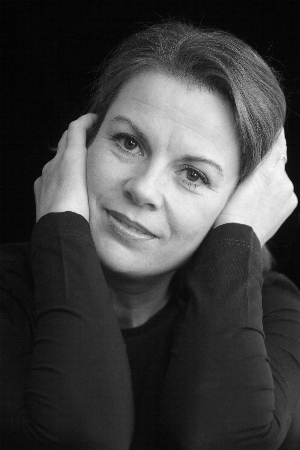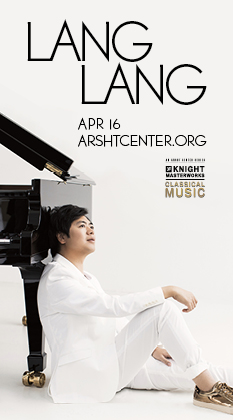Avoiding storms and singing Mahler, Bernarda Fink feels fortunate

Mezzo-soprano Bernard Fink will be the soloist in Mahler’s Symphony No. 3 with Franz Wesler-Möst and the Cleveland Orchestra this weekend at the Arsht Center.
Bernarda Fink is enjoying her good luck.
The Argentinian mezzo-soprano sings at Alice Tully Hall in New York City this week, dodging the recent Nor’easter by a matter of days. She missed Hurricane Sandy as well, making her debut November 1 with the Chicago Symphony Orchestra as soloist in Gustav Mahler’s Symphony No. 3. “Actually, I was very lucky because at the time everything happened in New York, I was in Chicago.”
But it isn’t the weather that she really feels lucky about. On the last leg of the longest U.S. tour of her life, Fink will give solo recitals in Philadelphia, Schenectady, and Manhattan with accompanist Anthony Spiri before arriving in Miami to sing the Mahler Third again, this time with the Cleveland Orchestra at the Adrienne Arsht Center Friday and Saturday. “I’ve spent a whole month in the U.S.,” she said. “It’s huge luck that so many wonderful projects came together.”
Specifically, she is excited about performing under the direction of Cleveland conductor Franz Wesler-Möst, whom she has known for twenty years. “I’m extremely happy and lucky to have the occasion to sing with him again.”
Mahler’s monumental Third Symphony is in six movements, the first of which alone can last as long as forty minutes. The work is scored for a huge orchestra, and it is not until the fourth and fifth movements that Mahler introduces the voices, which include an alto solo, boys’ choir, and women’s choir.
Fink credits Mahler with knowing exactly how to showcase a voice in an orchestral texture. “He spent the whole year working with opera singers at the State Opera in Vienna, so he knew about voice. In the fourth movement, it’s extremely transparent – it’s almost nothing, pianississimo when the cellos come in. The opening is so moving, especially because of the extreme contrast with the intensity of the previous movements.”
Similarly, in the fifth movement, when the mezzo soloist comes in alternating with choir and orchestra, “it’s quite intense,” she says. “The image is of Peter denying Jesus, saying to people ‘I don’t know him’ so this is a person feeling guilty and asking for forgiveness.”
Fink says that she identifies deeply with Mahler, and particularly the Third Symphony. “In a very simple way, [Mahler] explains the deeper truth of life, life’s mysteries and facts. He’s looking for God. He’s always searching for what is the essence of life. In the fourth movement, he’s speaking about deep pain and joy, and the text by Friedrich Nietzsche says joy is deeper still than heartache. This is the essence of the symphony. It’s so full of hope, speaking about what we are living every day, pain and joy.”
The performance at the Arsht Center will mark Fink’s Miami debut. “It’s a wonderful city and I know it quite well because I have a sister living in Miami.”
In fact, both of Fink’s siblings are singers. She will see her brother Marcos Fink next spring, during her residency at London’s Wigmore Hall, which she still calls “a huge honor” even though she has been associated with Wigmore for over ten years. “Wigmore Hall is one of the most traditional and famous halls specializing in chamber music. Lied cycles or recital cycles are closing in many houses, but Wigmore is really strong in exactly this repertoire. I’ll have an occasion to sing with my brother, in a duo recital with a fantastic accompanist, Michael Martineau.”
How does Fink go from singing with orchestra one week, to three solo recitals of varying repertoire the next, and then back to orchestra? For Fink, it is not about the size of the ensemble. “I don’t think there is a difference singing with a big orchestra than singing with a piano. Of course, in my ears, the feeling is different, but I don’t sing differently for this reason. It is the interpretation, the content of what you want to say with your singing, that decides how you sing. I think of an instrument like piano not as less volume, but as another color, another way to say a word.”
Fink’s multifaceted career reflects her ease with all types of vocal repertoire. Coming from a musical family, she attended the Instituto Superior de Arte del Teatro Colón in Buenos Aires, studying first as a soprano until she found her true voice as a mezzo-soprano. After winning first prize in the Nuevas Voces Líricas competition in 1985, she moved to Europe and is now based in Prague, where she is married to Valentin Inzko, Austria’s current High Representative for Bosnia and Herzegovina.
She has enjoyed enormous success, and was dubbed “opera’s most elegant voice” by the Daily Telegraph. In addition to appearances at opera houses in Geneva, Prague, Montpellier, and Salzburg, Fink has appeared with the London, Vienna and Czech Philharmonics, Gewandhaus Leipzig, Radio-France Philharmonic, Orchestre National de France, and at festivals including Salzburg, Vienna, Prague, Tokyo, Montreux, and the BBC Proms. She has sung under every major conductor today.
She also has numerous recordings, including an important series on the harmonia mundi label of Baroque and Classical recordings with René Jacobs, who introduced her to Baroque music over twenty years ago and has remained an important collaborator. But when asked how a Baroque singer approaches Mahler, Fink is reluctant to be labeled.
“I wouldn’t say that this is the other end of the spectrum. The time is over now, of specializing only in Baroque and having the straight voice. Jacobs tends to not have specialized singers; he likes real opera voices. Of course, you need a certain flexibility and lightness when you sing Baroque, but when I started singing Baroque that was like a big surprise in my life. Because I attended an opera school in Buenos Aires, and I immediately started doing Mahler, so this is like coming back to my origins.”
Fink’s most recent recording, “Canciones españolas,” takes her back even further to her origins. “I love this repertoire. I think Spanish songs are so special, and we chose very different composers, but all of them are fantastic. The composer who surprised me and became really very special to me was Rodrigo.
“Rodrigo uses folkloristic things, but I find it so charming and so incredible that he had this identification with music from the Middle Ages. I was positively shocked with the beauty of his Canciones sefardies, these Jewish Sephardic songs. I found them so profound and so intense. For me, Rodrigo was the discovery. It is wonderful music.”
The Cleveland Orchestra opens their Miami season 8 p.m. Friday and Saturday with Franz Welser-Möst conducting Mahler’s Symphony No. 3 at the Adrienne Arsht Center. 305 949-6722; arshtcenter.org/cleveland.
Posted in Articles
Leave a Comment
Mon Nov 12, 2012
at 1:00 pm
No Comments





